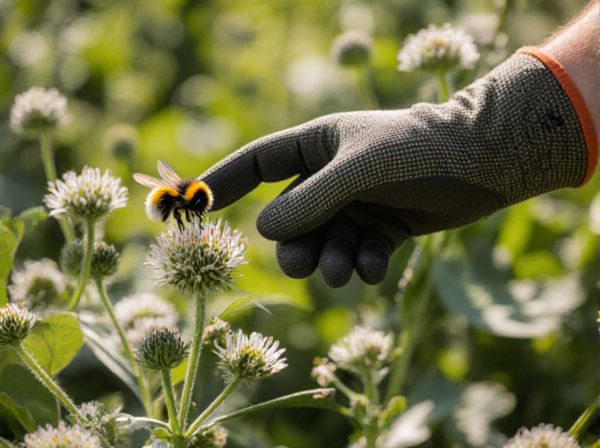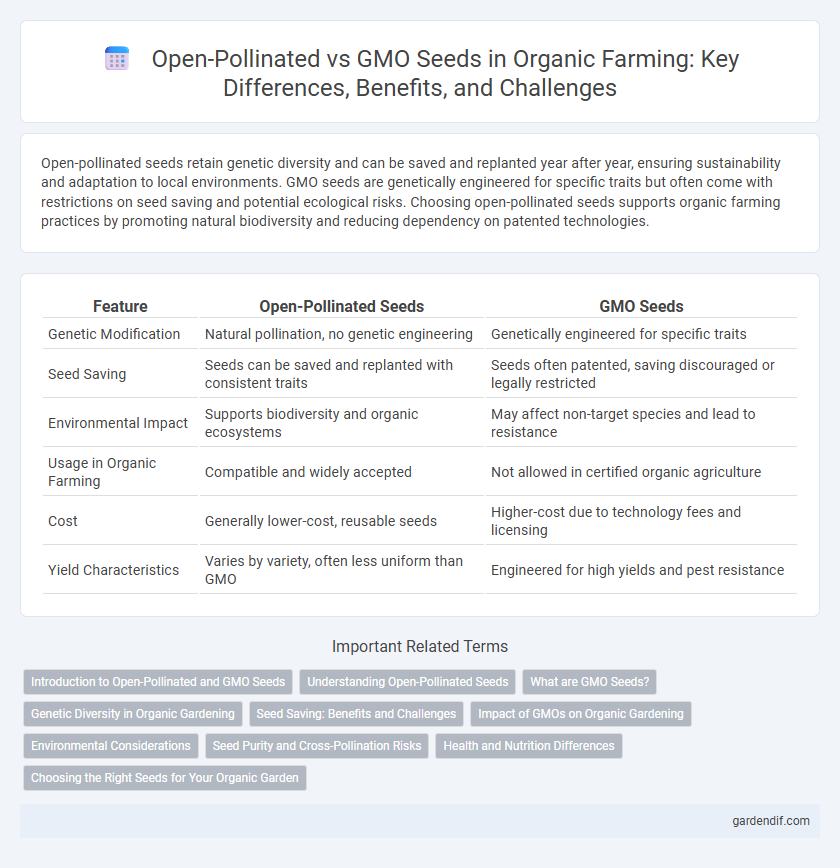
Open-Pollinated vs GMO Seeds Illustration
Open-pollinated seeds retain genetic diversity and can be saved and replanted year after year, ensuring sustainability and adaptation to local environments. GMO seeds are genetically engineered for specific traits but often come with restrictions on seed saving and potential ecological risks. Choosing open-pollinated seeds supports organic farming practices by promoting natural biodiversity and reducing dependency on patented technologies.
Table of Comparison
| Feature | Open-Pollinated Seeds | GMO Seeds |
|---|---|---|
| Genetic Modification | Natural pollination, no genetic engineering | Genetically engineered for specific traits |
| Seed Saving | Seeds can be saved and replanted with consistent traits | Seeds often patented, saving discouraged or legally restricted |
| Environmental Impact | Supports biodiversity and organic ecosystems | May affect non-target species and lead to resistance |
| Usage in Organic Farming | Compatible and widely accepted | Not allowed in certified organic agriculture |
| Cost | Generally lower-cost, reusable seeds | Higher-cost due to technology fees and licensing |
| Yield Characteristics | Varies by variety, often less uniform than GMO | Engineered for high yields and pest resistance |
Introduction to Open-Pollinated and GMO Seeds
Open-pollinated seeds are naturally pollinated by insects, wind, or other natural mechanisms, preserving genetic diversity and allowing gardeners to save seeds with consistent traits. GMO seeds, on the other hand, are genetically engineered to express specific traits like pest resistance or herbicide tolerance, often patented by biotechnology companies. Choosing between open-pollinated and GMO seeds impacts biodiversity, seed sovereignty, and long-term sustainability in organic farming.
Understanding Open-Pollinated Seeds
Open-pollinated seeds are naturally pollinated by insects, wind, or birds, allowing plants to maintain stable genetic diversity across generations. These seeds produce offspring true to type, meaning the plants grown from them retain the characteristics of the parent, which is essential for preserving heirloom varieties and supporting organic gardening practices. Unlike genetically modified organisms (GMOs), open-pollinated seeds avoid genetic engineering, promoting biodiversity and sustainability in agricultural ecosystems.
What are GMO Seeds?
GMO seeds are genetically modified organisms created by altering the DNA of plants to express specific traits such as pest resistance or increased yield. These seeds often contain genes from unrelated species, enabling crops to survive herbicides or produce toxins against insects. Unlike open-pollinated seeds, GMO seeds cannot reliably reproduce the same traits in subsequent generations, leading to dependence on purchasing new seeds each season.
Genetic Diversity in Organic Gardening
Open-pollinated seeds preserve genetic diversity by allowing natural cross-pollination, ensuring stable traits and adaptability in organic gardening environments. GMO seeds, engineered for uniformity and specific traits, often reduce genetic variability, which can compromise ecosystem resilience. Maintaining open-pollinated seed varieties supports biodiversity and enhances long-term sustainability in organic farming systems.
Seed Saving: Benefits and Challenges
Open-pollinated seeds allow farmers to save and replant seeds each season, preserving genetic diversity and reducing dependence on commercial seed suppliers. GMO seeds, engineered for specific traits, often come with legal restrictions that prohibit saving and reusing seeds, limiting seed sovereignty for growers. Seed saving with open-pollinated varieties supports sustainable agriculture but requires knowledge to manage cross-pollination and maintain seed purity.
Impact of GMOs on Organic Gardening
Genetically Modified Organism (GMO) seeds pose a significant risk to organic gardening by potentially contaminating open-pollinated crops through cross-pollination, compromising organic certification standards. The presence of GMOs in organic fields can result in genetic drift, leading to the inadvertent introduction of non-organic traits that undermine biodiversity and seed sovereignty. Maintaining strict separation between GMO and open-pollinated seeds is crucial to preserve the integrity and ecosystem balance of organic gardens.
Environmental Considerations
Open-pollinated seeds promote biodiversity and resilience by enabling plants to adapt naturally to local environmental conditions, reducing the dependence on synthetic inputs. GMO seeds often incorporate traits such as pest resistance and herbicide tolerance, which can lead to monoculture practices and potential ecological imbalances. Choosing open-pollinated varieties supports sustainable agriculture by preserving genetic diversity and minimizing environmental impact.
Seed Purity and Cross-Pollination Risks
Open-pollinated seeds maintain genetic purity through natural pollination methods, enabling consistent seed traits over generations, whereas GMO seeds often contain engineered traits that can cross-pollinate with non-GMO plants, risking genetic contamination. Seed purity is critical in organic farming to preserve biodiversity and comply with organic certification standards, which restrict GMO contamination. Cross-pollination risks increase when GMO crops are planted near open-pollinated or heirloom varieties, potentially compromising seed integrity and organic status.
Health and Nutrition Differences
Open-pollinated seeds maintain genetic diversity, resulting in nutrient-rich crops with naturally enhanced flavors and health benefits. GMO seeds often prioritize yield and pest resistance but may carry concerns related to allergenicity and long-term health effects. Studies suggest organic open-pollinated varieties support better nutrient profiles and reduced chemical exposure compared to GMO counterparts.
Choosing the Right Seeds for Your Organic Garden
Open-pollinated seeds preserve genetic diversity and adapt naturally to local growing conditions, making them ideal for organic gardens focused on sustainability and seed saving. GMO seeds are engineered for specific traits like pest resistance but may conflict with organic certification standards and often require proprietary buying agreements. Choosing the right seeds for your organic garden involves selecting non-GMO, open-pollinated varieties to ensure environmental health, seed sovereignty, and compliance with organic growing principles.
Open-Pollinated vs GMO Seeds Infographic

 gardendif.com
gardendif.com